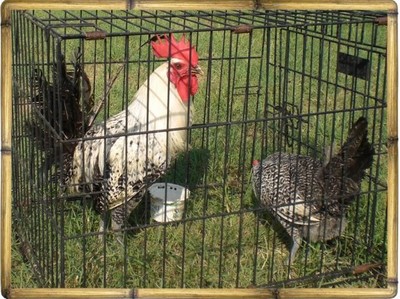Fayoumi hen
The Fayoumi is a breed of chicken originating in Egypt. Fayoumis are a very old breed in their native region, and are named for the Faiyum Governorate southwest of Cairo and west of the Nile
They are flighty birds, but not aggressive to people and the males are fairly tolerant of other roosters
The Fayoumi chicken is also known as the Egyptian Fayoumi and with good reason. The Fayoumi had its beginnings in Egypt as an egg layer and is a very old breed. It is named for the Faiyum Governorate which is southwest of Cairo and west of the Nile. The Fayoumi is very similar in appearance to the Silver Campine, a chicken breed from Belgium. Some sources believe the Campine may be descended from a chicken similar to the Fayoumi taken north into Europe by the Romans
It is not certain how long the Fayoumi have been in the United States but some were imported to the Iowa State University in the 1940s. They are not recognised by the American Poultry Association and there is no Standard of Perfection for them. They made their first appearance in the United Kingdom in 1984 when the Domestic Fowl Trust introduced them to that country
Iowa State University has played a big part in their preservation and study and has maintained a flock since the early 1940's, when the dean of agriculture carried some hatching eggs home from Egypt for the poultry genetics program to study
The breed has been a most interesting one to study as well. Scientists at Iowa State have found that the breed has an excellent resistance to a number of viral and bacterial infections, possibly including avian influenza
This makes a very interesting breed when you consider the potential for pandemic outbreaks in birds
Description
The Fayoumi has an upright tail. The breast and neck jut forward, something like a roadrunner, giving them a dashing appearance. The Fayoumi is regarded as a ‘light’ breed. Cocks weigh around 2 kilos (4.5 pounds) and hens only 1.6 kilos (3.5 pounds). There are no variations as to colour. All the cock birds are extremely handsome with silver-white feathers on the head, neck and saddle with the remainder of the plumage being barred in black and white. The hens have silver-white heads and necks with the rest of the body barred. The technical term for chickens which show barring in silver or gold is ‘pencilled’.
They are a single-combed breed, with dark, horn-coloured beaks and slate-blue skin. The comb, wattles and earlobes are red. The wattles are reasonably large and the earlobes have a white spot.
It is a hardy breed. Genetic research and evidence from breeders suggest it has excellent resistance to viral and bacterial problems. Coming from Egypt, it would be surprising if it didn’t cope well with hot conditions – but it does. They fly well and will need a better than average pen if they are not to escape. They tend to vocalise more like guinea fowl than chickens and will make a great racket when caught
Breeding
The Fayoumi does not go broody as a young hen but may do so after a couple of seasons of laying
Fayoumi hens are good layers of small, off-white eggs. They are not given to broodiness as pullets, but can be when they reach two or three years of age. The breed is fast to mature, with hens laying by four and half months, and cockerels crowing at five or six weeks
Young hens do not tend to be broody, but they become more broody as they get to be two or three years old. They are excellent layers of small off-white eggs. Sometimes their eggs tend to be pink-tinted
Feeding
The Fayoumi is an excellent forager and, given the opportunity and reasonable pickings, it will fend for itself with little or no need for supplementation of its diet
a Fayoumi cockerel
A Fayoumi
A pair of Fayoumi from Britain
A Fayoumi cock
Photo courtesy of Mckinney & Govero Poultry
Another Fayoumi hen
Photo courtesy of Wes Rolley






ساحة النقاش